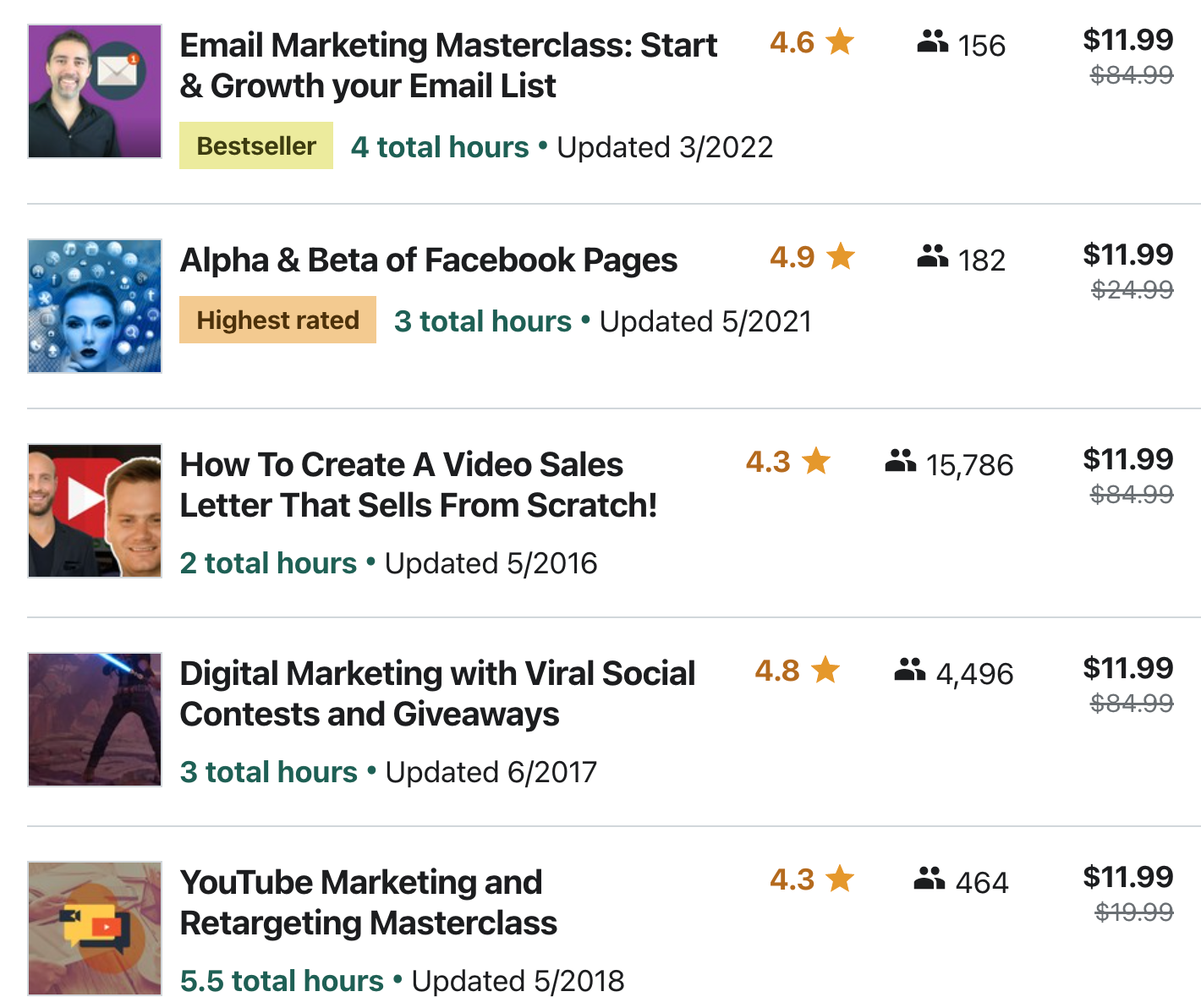
Kajabi vs Thinkific, Teachable, Kartra, Udemy, etc. - How to Choose the Best Course Platform
Mar 30, 2022Want to sell your first online course? Learn 3 ways to automate and market your course, pros and cons of each, and recommendations from a course platform expert.
Are you ready to sell courses, share your acquired knowledge with others, and make money doing so? It's a popular choice to make once you've worked in your online businesses for a while and have proven experience under your belt.

But once you decide, "Okay, I'm going to sell a course. I know my niche, topic, and big win. Let's do this!", your next big decision is WHERE to host and sell that course, right?
Many people turn to business groups in Facebook for some help - you've probably seen them - and they simply ask, "What is the best platform to sell courses on?"

Well, even though I'm a course platform expert, it's impossible to answer that question. It's WAY too vague. There's not enough detail to base a recommendation on. So what you get instead are people just saying the platform that THEY use - which may or may not be a good fit for you.
When it comes down to it, what's "best" for me may not be what's "best" for you. This is the kind of information I wish these post-ers would share when they ask:
- What their business consists of now (in very basic terms) and what their long-term goals are
- What they already have in place and of that, what they insist on keeping
- Where they are with price/value; their primary goal is either to keep the price down or to get good value for the price since they'll be making money with their course(s)
 Feminine stock images in this blog post are from Magnolia & Sage
Feminine stock images in this blog post are from Magnolia & Sage
Here's a much better version of that post:
I'm a business coach and I'm looking for a platform to host my new course. It'll be the first of several and I eventually want to set up evergreen funnels and be as hands-off as possible. I have a WordPress website (open to moving it), an email list on ConvertKit (have 10K subscribers and complex automations so I don't want to move now but will eventually), and I don't want to host my course on my site. I don't mind paying more for a course or all-in-one platform if the value is there.
Do you see the difference? NOW we can all really help the person find the "best" course platform, one that fits their personal situation and criteria. And since I don't know those details about you either, dear reader, I'm unable to tell you what's "best" for you.
Instead, I'll help you with the research process that goes into finding it. Let's talk about what the 3 main types of course platforms are, some of their general pros and cons, and what you should be looking at as you make your choice.
Then, so you can see a real-world example from this decision-making process, I'll share briefly why I chose the one I did (Kajabi) and why it's been such a great fit for me.
First, though, let me address a big question you may have, especially if you're a WordPress user ...
"Hey, what about just using WordPress with course, membership, and cart plugins?"
There are many reasons I won't be going into detail about this option.
I actually don't recommend hosting your course on your WordPress site unless you're a WordPress Developer or at least a WordPress and coding expert. Since that's not the case for most of us, especially Creators and creative types, using WordPress pages and plugins to house and sell your course is too technical and therefore aggravating, time-consuming, and not cost-effective.
One of my business mantras is "K.I.S.S. Keep It Simple, Superstar!". Running your course on WordPress is anything but simple. It also has some significant downsides like slowing your site down, causing you to pay more for hosting when you grow, and requiring lots of "duct taping" of needed plugins and things like an EMS to make it work with any complexity.
To me, a SaaS is truly the only way to go.

Okay, ready ... set ... LET'S GET STARTED!
3 Types of Course Platforms
There are 3 main types of online course platforms to sell your course. Below are some examples of specific course platforms, descriptions of each type, and which would be my recommendation, in general, if you decide that type of platform is best for you.
1. Course Marketplace
Options: Udemy, Coursera, Skillshare
The best way I can describe a course marketplace is to say that it's kind of like Etsy or Amazon - but for courses. So one website offers a diverse range of course topics, course creators, and prices.
Customers go to these sites and either browse through all the offerings til they find something that interests them, or they can search for specific topics and fields of study.
2. Course Platform
Options: FG Funnels, Learnworlds, Teachable, Thinkific
A second option is to use a course platform. This is a website which allows you to build your course on their site as well but instead of taking such a hefty cut of your profits, they charge you a flat monthly or annual fee. Some also take a small percentage of sales depending on which plan you choose.
These types of course platforms don't market your course for you; they just provide a place to house it. They may have some extra features that will help you market your course but, for the most part, you'll need to provide that infrastructure yourself - website, blog, email marketing service, funnels, nicer sales pages and checkouts, etc.
My recommendation: Teachable
3. All-in-One Platform
Options: Kajabi, Kartra, Membervault, Systeme.io
All-in-one course platforms DO provide you with a website, blog, email marketing service, funnels, nicer sales pages and checkouts, etc. - in addition to housing your course.
They're also the most likely to be able to handle selling other digital products well such as a membership, coaching and other services, even - in the case of KAJABI - your podcast, paid newsletter, and physical products (via Shopify Lite integration).
When they say "all-in-one", they mean it, lol. This type of platform makes it possible to run your whole digital business from one place because they consolidate all these features. It keeps you from having to patch them all together yourself.
My Recommendation: Kajabi
The Pros and Cons of the 3 Types of Course Platforms
Course Marketplaces - Pros and Cons
In general, course marketplaces are not recommended, at least for sharing your paid courses and certainly not for your signature course. Yes, these course "stores" do one nice thing - they market your course for you by bringing traffic to the site where, hopefully, people find your course and sign up.
However, with course marketplaces, you're not building your own mailing list of leads and customers. That information belongs to the platform. There are some sly workarounds but those can not only get you kicked off the platform, they aren't as effective as just using another way to sell your courses where you DO get to keep your own mailing and customer list.
In Udemy's sales page text for instructors, they even say, "Get rewarded. Expand your professional network, build your expertise, and earn money on each paid enrollment."
So they can help you get your name out there, become a better instructor perhaps, and earn money. But they're not saying they'll help you serve your niche and build your list because they don't.
You also have little control over your pricing. While you may set your course price at, for example, $97, these course marketplaces often run sales and offer discounts. So your course could sell for $7 and you have no control over that.
Here's a recent screenshot from Udemy:

As you can see, these are all smaller, shorter courses of only 2-5 hours. Also note the huge price reductions. No doubt they're used as a selling tactic - but if you put your blood, sweat, and tears into a course, do you want your $85 course sold to the masses for only $12?
I know what you're probably thinking: "The number of students is impressive tho." True, but please also note the 6 and 7 years those courses have been available (at minimum). They could've sold to 10% the amount of people but with their own higher price tag on their course and they would've made a ton more money (not to mention all the other benefits to having your course on your own territory).
So with all that said, it's only recommended to use a course marketplace like Udemy, Coursera, or Skillshare to share a free or low-priced course. It could act a bit like a lead magnet and increase familiarization of your name as a resource for that niche or topic. It could also be a way to market test your idea and see if it's even worth pursuing.
But if you try this route and your free or first course is a success, I wouldn't stagnate on a course marketplace forever. I'd move it to a course or all-in-one platform that's more "your own" and/or use the feedback you got to improve and expand that course, then sell it from your own space where you get to keep all the profits.
Again, for the reasons stated above, it's likely not a good idea to put your mid- to high-priced course and/or signature course on a course marketplace. Freebie, low-cost, or first course might be viable if you have a thought-out strategy (and exit strategy).
Course Platforms - Pros and Cons
The Pros of course platforms are that they're great at what they do - allow you a place to host your course. They cost less than all-in-ones (at least on the face of it). Some of them make course creation quite easy and straightforward.
Some of the Cons of course platforms are that they often give you limited personalization and branding options. You have to integrate them with other solutions to run a business, which means you must learn multiple systems. This also means that, when you add up the costs of those additional tools, course platforms are not as "affordable" as they look.
Speaking of cost, one thing I've been surprised by over the years that I've been watching course platforms sprout up left and right is that the more popular ones (Teachable, Thinkific) now have prices approaching those of all-in-ones - yet they don't perform nearly as many functions.
So they certainly don't make as much sense to use as they used to. For instance, FG Funnels and Teachable Pro are now $119/mo and Thinkfic Pro $99 while Kajabi Basic (with a ton more features) is $149/mo (or $119 if paid annually).
Riddle me this: If you can buy 5/8 of a pizza for $20 why wouldn't you just pay $22 for the whole thing? And then you aren't left hungry nor having to buy an $8 salad as well. Do you smell what I'm cookin'?? 🥗🍕😂

All-in-Ones - Pros and Cons
All-in-ones are my preferred choice but they do have some Cons. As they say, "You can't be the best at everything," so while they have alllll the features there may be a few that aren't as good as what you came from.
For instance, the email system in an all-in-one will never be as pretty as you're used to with FloDesk - because that's ALL FloDesk does is make pretty emails and they excel at it. Plus they only have to appeal to one type of client whereas all-in-one's need a broader appeal.
The main objection to all-in-ones seems to be cost which again, at face value, seem like they cost a lot more than course platforms. They can also seem like a lot to learn at first - how to set up your website and blog, make some landing and sales pages, getting your opt-in form and automation set up, etc.
But of course, that's a learning curve you'd have using a course marketplace or a course platform PLUS you'd have to figure out how to make those work with your other business software - email marketing systems, funnel system, landing page provider, podcast host, etc.
The Pros to all-in-ones (especially Kajabi, which is the one I use myself and am most familiar with) are numerous. The consolidation and simplification of your business is a BIG one. It's so nice to have all the pieces under one roof, have one learning curve, know that everything is automated and talking to each other without paying for/setting up Zapier, etc.
Another Pro to all-in-ones is the cost savings. The best example I can provide is to have you read (or even skim! ha) this post I wrote called, "Kajabi is Too Expensive": How It Actually Saves You Money Over Cheaper Systems. It goes through my whole thought process when I chose Kajabi.
What You Should Consider When Deciding On the Best Course Platform for YOU
As I said at the beginning of this post, the "best" platform to host and sell your course on is a highly subjective thing. I often see people asking the one-liner version of this question in entrepreneurial Facebook groups and it's a bit frustrating because it's impossible to answer.
- I need more information about where you are and where you want to be before a course platform expert like me can give you a helpful answer.
- There are SO many little details among the plethora of options that the best for you will be different than the best for me.
How To Choose the Best Course Platform - Kajabi vs Teachable vs Udemy and More
Now that you know you have 3 different TYPES of course platforms to choose from, here's my last bit of advice - 4 things to do to help you choose:
1. Write down in a Google Doc, etc. not just what courses or digital products you want to offer now but dream about your future plans too.
2. Be honest with yourself about how techie you are, how much time you want to spend on techie things, do you mind paying for tech help if you need it, etc.
3. Make a list of features you're looking for in your course platform of choice. List them in order of most to least important. When you're comparing features, it really helps if you already know "this feature is a deal-breaker; I must have it" vs "this feature would be nice but I can get by fine without it."
4. Research the course platforms I've linked above (psst! the ones I left out weren't by accident, cough cough). Narrow it down to your top 3 or 4 choices and then do a FREE TRIAL with each one!

You can ask a million strangers on Facebook til you're blue in the face but the only way to truly know which is the best course platform for you is to try them out. Start digging around. Build stuff (go ahead; you can't hurt anything!). Search their help files. Do a few support tickets and see if you're satisfied with their customer service.
Yes, it may seem like a lot of time and research but it's for the best in the long run. You don't want to choose a course platform hastily and then regret it and have to start over somewhere else later, right?
I hope this post was helpful and that you find YOUR best course platform soon!
xo,



